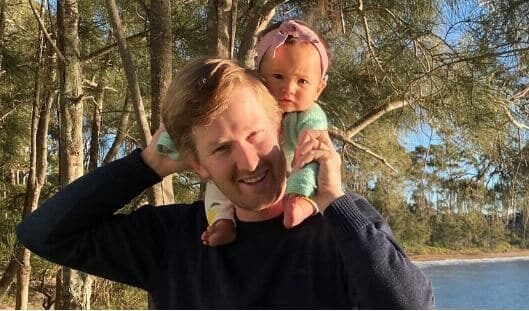
This piece was originally published in RACGP on 2 June 2023.
In late 2020, Dr Hugh Stump was in his car when he took a call that will stay with him forever.
Already a father to a young daughter, the GP and his wife, Hanako, were expecting their second child and needed to travel away from their home in Orange, NSW, for further tests.
Up to that point the pregnancy had mostly seemed routine, Dr Stump told newsGP.
‘Our baby’s nuchal translucency was all normal, the morphology was normal,’ he said. ‘My wife was in her late 20s and she was healthy, and the first pregnancy was normal.’
However, during a 28-week ultrasound, Dr Stump recalls a sonographer spotting a suspected small pericardial effusion around their baby daughter’s heart.
‘I thought that maybe our obstetrician was over-investigating a little bit,’ he said. ‘Anyway, she sent us for a full obstetric ultrasound.
‘The sonographer there … she thought that maybe one of the cysts in the brain was a little bit dilated and that’s when the alarm bells were starting to ring.’
And so around the 30-week mark, they made the journey back to Nepean Hospital for a full foetal MRI.
‘I will never forget … as we were driving back to Orange, we got a call from the foetal medicine specialist saying that there were some pretty complex brain changes that would be consistent with congenital CMV [cytomegalovirus],’ Dr Stump said.
The diagnosis had Dr Stump and his wife bracing for the worst.
‘I think the words they used were “a high chance of severe disability”,’ he said. ‘It was terrible.’
While his training meant Dr Stump knew about congenital CMV, he was not aware of the risk it could pose during pregnancy when it mattered most. That is a gap that he has naturally worked hard to fill since.
According to estimates published by the Department of Health and Aged Care, around 400 children in Australia will be born with or develop CMV due to primary or non-primary maternal infection every year.
It is also the second most common cause of congenital malformation in Australia.
‘I’m a bit of a numbers man and I was really shocked,’ Dr Stump said.
‘They think about half of those cases are preventable, yet there’s so many health professionals who have never even heard of congenital CMV.
‘I definitely think there are some big gaps in training.’
Only a sixth of pregnant women are aware of the dangers of CMV infection in pregnancy, a 2019 study suggests. Separate research indicates that fewer than 10% of health professionals routinely discuss preventing CMV with pregnant women.
Fortunately Dr Stump’s daughter, now two and a half, is thriving compared to that bleak original prognosis. While she has profound bilateral deafness and uses cochlear implants, she is free of the neurodevelopmental disabilities such as epilepsy and cerebral palsy that can occur.
However, Dr Stump and his family are acutely aware of the challenges other families face and they want to help others to avoid a similar situation.

The Stump family pictured above
Speaking to newsGP as part of cytomegalovirus awareness month in June, Dr Stump believes GPs are ideally placed to flag the risks and what can be done to mitigate them.
‘If you talk to any reasonably educated woman of childbearing age, she knows the basic measures to prevent listeriosis and toxoplasmosis, but they’re a blip on our radar compared to congenital CMV,’ he said.
‘We’re in a perfect position to be able to provide really simple advice around preventive strategies to help minimise that risk.
‘Unfortunately, there is a broad lack of education in the medical profession around [its] significance and how it can be prevented.
‘I certainly found out the hard way.’
He recognises that not everyone will adopt all the advice, which includes recommendations to kiss your child on the forehead and not on the lips; wash hands regularly especially after changing nappies, and avoid sharing food or utensils with young children.
‘The flip side to that is actually it’s empowering for women to be told, because they can still decide to do those things, but at least they know the risks associated with that,’ Dr Stump said.
The couple now also feature in an RACGP-accredited CPD course about the condition, a project that involved input from the Cerebral Palsy Alliance.
‘Any chance to upskill is a great way of helping to reduce the burden of disability of kids in Australia from congenital CMV,’ Dr Stump said.
Even more than two and a half years after the phone call they received on the road to Orange, the couple still feel fortunate things turned out as they have.
‘[Our daughter] didn’t get away with it scot-free, but she’s a beautiful kid,’ Dr Stump said. ‘She’s got a really vibrant personality and we wouldn’t change anything.
‘But you also wouldn’t wish it on any parent. We just wish we were told about the risks of CMV.’
Dr Stump appears in a free RACGP CPD accredited course: Infections in Pregnancy, which is available on Praxhub. It is accredited for 1.5 educational activity hours.